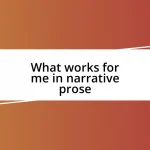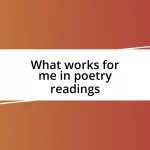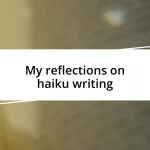Key takeaways:
- The author’s initial encounter with poetry was transformative, providing solace and reflection during a tumultuous time in high school.
- Life’s responsibilities and feelings of inadequacy led to a gradual disconnection from poetry, resulting in a loss of creative expression.
- Re-establishing a poetry routine and exploring diverse styles facilitated a reconnection, allowing the author to rediscover joy and inspiration in the art form.
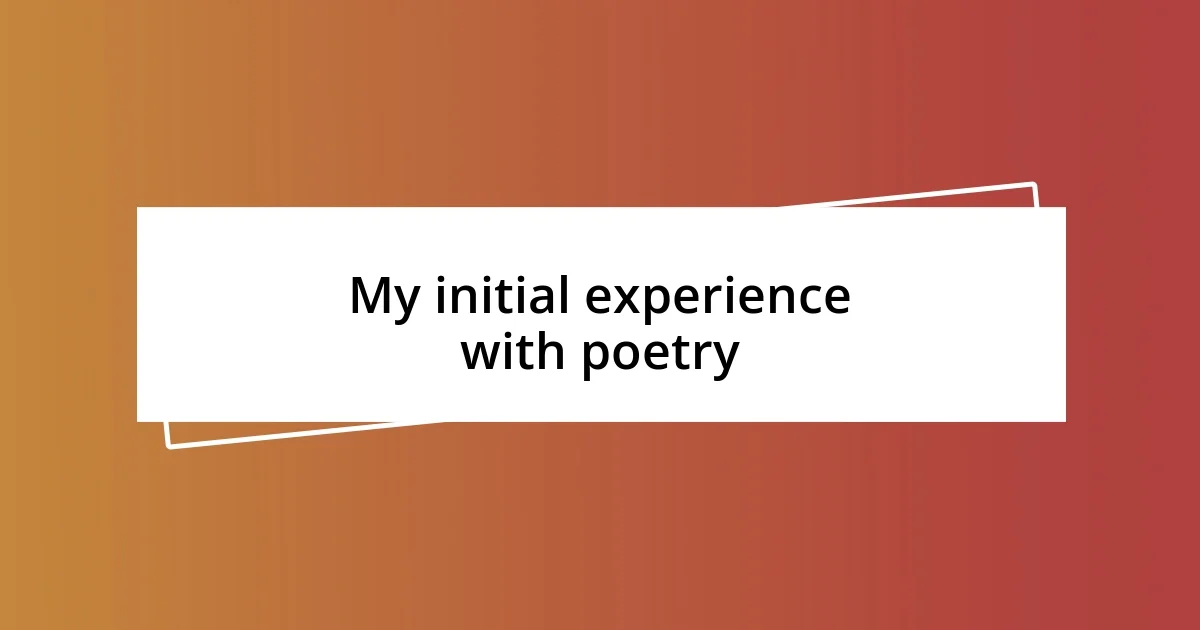
My initial experience with poetry
I still remember the first time I stumbled across a poem that truly resonated with me. It was in high school, a weathered anthology tucked away in a corner of the library. As I read Robert Frost’s “The Road Not Taken,” I felt an unexpected jolt—like a light switch flipping on. Why did those simple words strike such a deep chord?
Reflecting on that moment, I can’t help but smile at my younger self, sitting cross-legged on the floor, lost in thought. I was grappling with choices, unsure about my path, and there it was—a poem reflecting my inner turmoil. This little book became my secret refuge, a place where I could explore my feelings without it feeling like a burden.
Poetry felt intimate, like a conversation with an old friend who just seemed to get me. It was fascinating how a few carefully selected words could evoke such vivid imagery and emotion. Have you ever felt that rush when a piece of writing mirrors your own experiences? That connection was intoxicating and kindled a spark that lingered long after I closed the book.

Reasons for losing interest
Losing my connection to poetry felt gradual at first, like a slow fade from vibrant colors to sepia tones. Life started to pile on responsibilities, and I often found myself too busy to appreciate the art I once cherished. The moments I spent exploring new works morphed into fleeting seconds of skimming lines during a lunch break, which simply couldn’t capture the same magic.
Then there was the overwhelming sense of inadequacy that crept in as I compared my own scribbles to the luminaries of the genre. Rather than inspiring me, my inner critic began to drown out the joy of writing. I remember sitting at my desk, staring blankly at my notebook while recalling the passionate lines of poets like Sylvia Plath and Langston Hughes that seemed galaxies away from my own attempts. It felt as if, in those moments, I had lost my voice entirely.
Lastly, I noticed my priorities had shifted. While I was once eager to explore a variety of styles and themes, my focus narrowed. I found myself consumed with everyday tasks and the noise of modern life, which left little room for reflection or creativity. Poetry started to feel like a forgotten friend—one I couldn’t quite find the energy to reconnect with, even though I deeply missed the warmth of those shared moments.
| Reason | Description |
|---|---|
| Busy Lifestyle | Responsibilities piled up, making it hard to dedicate time to poetry. |
| Inadequacy | Comparisons to established poets made me doubt my own abilities, stifling creativity. |
| Shifted Priorities | Everyday noise took precedence, pushing aside the intimate connection with poetry. |
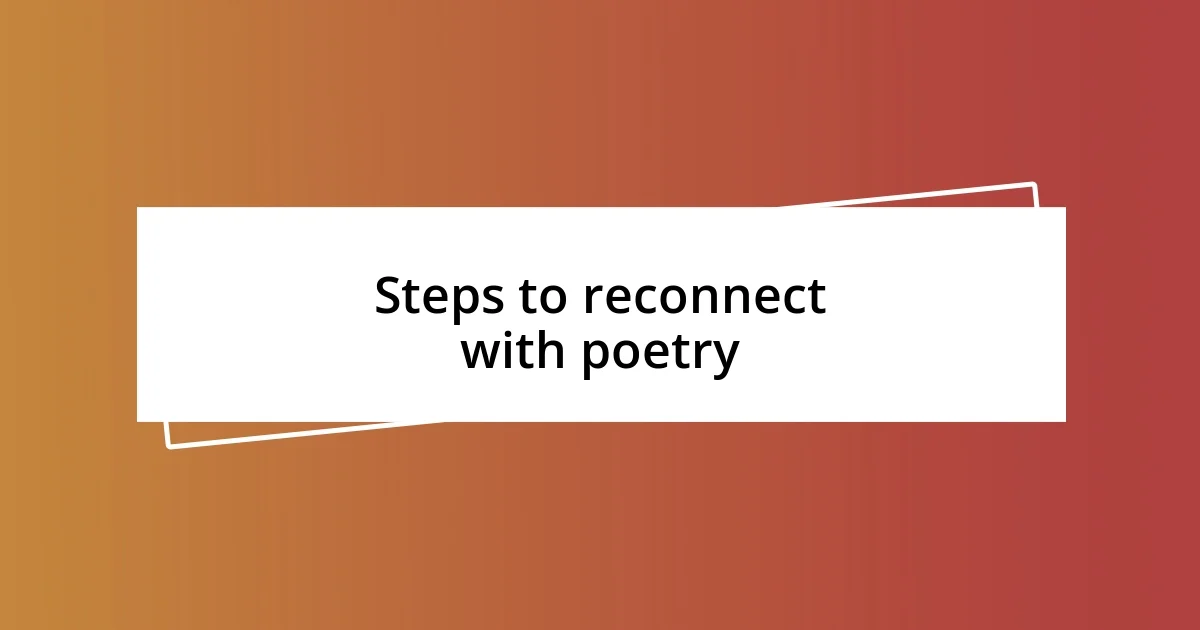
Steps to reconnect with poetry
Reconnecting with poetry can be an exciting journey, and it doesn’t require a grand gesture. Sometimes, all it takes is revisiting those cherished collections that once brought me solace. I remember combing through my old poetry anthologies, flipping through the pages filled with memories, and finding lines that resonated deeply with my current experiences. That first moment of re-engagement was like spotting an old friend in a bustling crowd—it brought a rush of nostalgia and comfort.
Here are some simple steps I’ve found effective in reigniting my passion for poetry:
- Create a Cozy Reading Space: Establish a quiet nook where you can immerse yourself in poems without distractions.
- Explore Diverse Poets: Seek out voices that differ from what you previously enjoyed. Their unique perspectives can open new avenues of inspiration.
- Set Aside Regular Time: Dedicate specific moments in your week to read or write poetry, integrating it back into your routine.
- Join a Poetry Group: Connecting with like-minded individuals can spark discussions that deepen your appreciation and understanding of the craft.
- Write Freely: Allow yourself to scribble without judgment. Embrace the messy process of creation, as it often leads to unexpected discoveries.
As I implemented these steps, each line I read started to intertwine with my emotions, developing a fresh intimacy. It was a little bit like being on a treasure hunt, where every poem uncovered pieces of my own journey that I had forgotten.

Exploring various poetry styles
Exploring various poetry styles was like walking through a vast, colorful gallery after years of living in grayscale. I vividly remember the first time I stumbled upon slam poetry—it was raw, powerful, and full of life. The rhythms and passionate delivery struck a chord within me, reigniting a spark that had long been dimmed. Could this modern form of expression be the bridge I needed to reconnect with the essence of poetry?
Haiku, with its elegant simplicity, also captivated my imagination. Engaging in this style felt like painting with just a few strokes—every word had to be deliberate, every syllable counted. I recall crafting my first haiku, capturing the fleeting beauty of a sunset in just seventeen syllables. It challenged me to distill my thoughts into their purest form. Hasn’t everyone had moments where they wanted to communicate an overwhelming emotion in just a few sharp lines?
Then there was the world of free verse, which unleashed a different kind of freedom. Without the constraints of rhyme or meter, I explored thoughts and feelings in ways that felt raw and authentic. I remember pouring my heart out on the page, each line flowing like a stream of consciousness. It was liberating to realize that poetry could be as fluid and evolving as my own experiences. Isn’t it fascinating how various styles can evoke such distinct feelings and reactions?
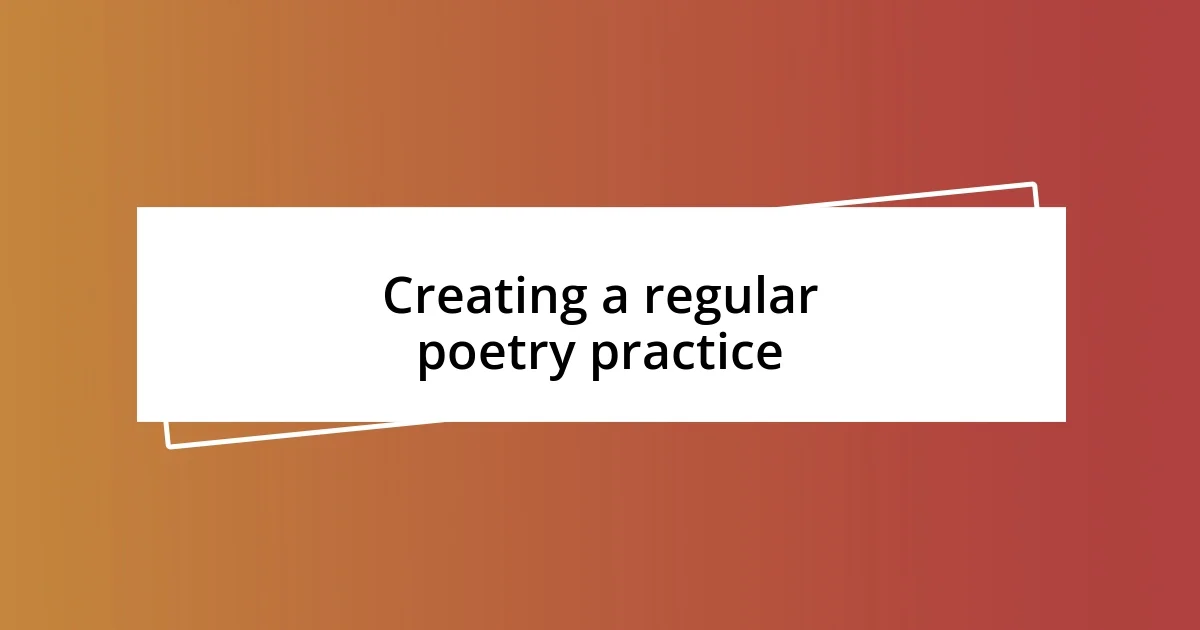
Creating a regular poetry practice
Creating a regular poetry practice has transformed my relationship with this art form. I made it a daily ritual to set aside just ten minutes each morning for poetry. During this time, I would read a few stanzas from a favorite poet or even jot down fleeting thoughts and feelings. There’s something magical about starting my day enveloped in words that stir my soul; it’s like refueling my spirit with each line.
As I settled into this practice, I found that the act of writing poetry became a sanctuary for my emotions. I remember one evening, overwhelmed with a whirlwind of thoughts, I opened my notebook and let the words spill out. The rhythm flowed effortlessly, and I was surprised at how cathartic it felt to articulate my feelings on the page. Have you ever felt that surge of relief when you finally put pen to paper, capturing those chaotic thoughts and emotions? It’s truly healing.
Incorporating poetry into my routine also meant celebrating its presence in unexpected moments. I started to carry a small notebook with me everywhere, ready to capture those fleeting sparks of inspiration. One day, while waiting in a café, I observed the world around me: the barista’s focused expressions, the sunlight streaming through the window, and I couldn’t help but scribble lines about it. Each snippet captured felt like a glimpse into everyday beauty, reminding me that poetry can flourish anywhere if we remain open to it. Doesn’t it feel refreshing to realize that inspiration can be found in the simplest of moments?

